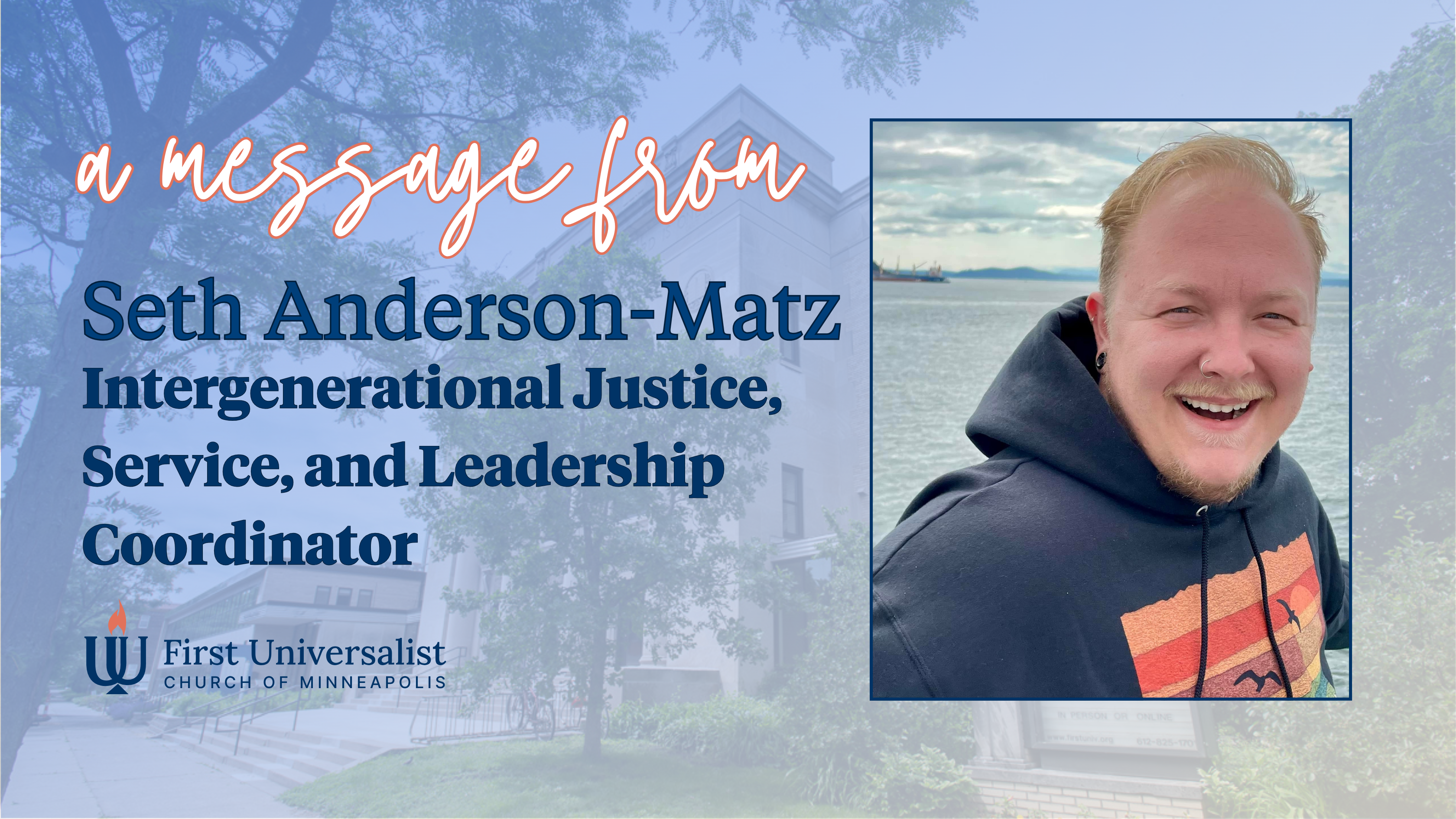A Tale of Two Churches
News –

My work here at First Universalist this church year is focused on integrating children, youth, and families more deeply into the life of the larger congregation. This comes partly in response to feedback we have received over the years, from children and adults alike, that they experience First Universalist as “two churches” — that is, an “adult” church and a “children, youth, and families” church. This often looks like our children and youth remaining mostly contained to children and youth specific spaces, and adults (who are not parents/guardians of children or youth) mostly interacting with other adults at church.
There are definitely ways this kind of divided model can be useful. It allows for quiet and focus without the usual kid distractions, offers respite for parents/guardians and other adults who otherwise have very little time without kids, and ensures children and youth are cared for in spaces suited to their particular developmental needs.
But there are also several consequences. Parents/guardians of children and youth often mention a bisected experience of church, or don’t feel they can show up to church as their full selves. We also consistently see that most people volunteering in our Religious Education programs are moms of children and youth (as well as other parents/guardians of school-aged children, but mothers being the overwhelming majority) who are already spread thin with obligations. This not only leads to discrepancies between our RE enrollment numbers and our volunteer capacity, but also reifies implicit biases around gender roles, labor, and who is ultimately responsible for caring for our children.
On top of all this, many have also expressed a perceived gap in recognition and relationship between children, youth, and families and other adults at First U. Many children and youth don’t feel a meaningful sense of connection with the adults who share their church, and likewise, many adults don’t know the names of the kids they pass in the halls each Sunday.
Research affirms what many of us intuitively know: young people thrive when they have at least three trusting relationships with adults outside their immediate household. Adults, especially older adults, experience numerous benefits to their mental, physical, and spiritual health when they have meaningful relationships with children in their lives. And not only do we flourish as individuals when we prioritize intergenerational connections, but so does the church at large.
But here’s the awkward truth: this work is new for us. Even though we wish it weren’t. This work can feel clunky at times because we are not yet the integrated and intergenerational spiritual community that we want to be and wish we already were. While naming that gap can feel embarrassing, it also gives us a wonderful opportunity to humbly turn our attention toward continued learning and experimentation.
What might become possible if we do this well? What would it be like for children, youth, and adults of all ages to feel truly woven into the fabric of congregational life? What new opportunities might emerge? What creativity, innovation, and responsiveness could arise in our ministries? What new layers of love and trust might be uncovered? How might new opportunities for leadership and contribution transform the lives of our young people, and how might the practices we share with our children offer new points of entry for those longing for more connection, play, and relational depth? What harms might we heal, and what future might we shape for this community?
This Sunday, as we celebrate Child Dedication and welcome new members into our community, we have an opportunity to embody this vision. New relationships. New belonging. New ways of being together across age, experience, and stage of life. May we meet this moment with openness, curiosity, and a shared commitment to building one vibrant church with the sacred wisdom and authentic presence of every generation.
Seth’s primary responsibilities at First Universalist include planning and leading Common Ground Sundays, an all-grade-levels program intended to ground our children and youth in projects of meaning-making and care for our wider community, as well as facilitating and consulting with children, youth, families, and adult lay leaders to deepen pathways to shared intergenerational leadership and ministries.